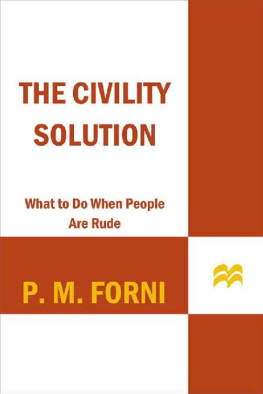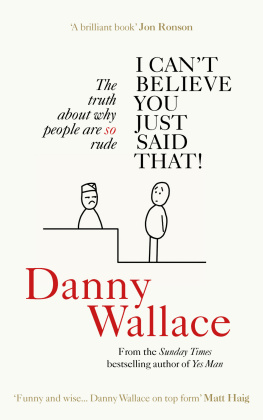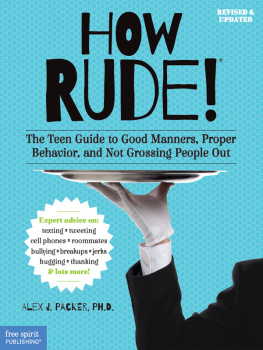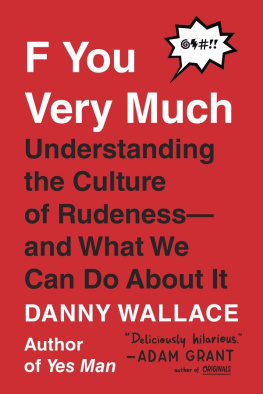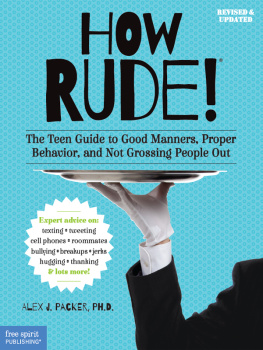Contents
About the Book
Passive aggression. Victim blaming. Snarky tweets. Queue-jumpers. Idiots who are #justsaying. Banter. Furious waitresses who refuse to sell you a hot dog We are ruder than weve ever been.
In this incisive and very funny book, Danny Wallace investigates the new wave of rudeness that threatens to overwhelm us. He meets psychologists, psychiatrists, bell boys, cab drivers, bin men, barristers, politicians, a limo driver called Jos and at least one expert in cooked meat production. He examines Radical Honesty in Germany and road rage in LA. He even confronts his own troll. And in doing so, he brilliantly uncovers the hidden truths behind what makes us rude, whether its catching, and how even one flippant remark can snowball into disaster.
From the mayor in Bogot who recruited an army of mimes to highlight inconsiderate driving, to the jihadist who launched a blistering attack on the bad manners of his fellow ISIS militants, this is an eye-opening and often hilarious exploration of the way humans work and why it is time for an anti-rudeness revolution.
About the Author
Danny Wallace is a Sunday Times-bestselling author who lives in Los Angeles and Suffolk. His award-winning column in ShortList magazine reaches more than 1.3 million readers weekly. He has made comedies and documentaries for television and radio, and won the Arqiva Award for Presenter of the Year as host of the Xfm Breakfast Show with Danny Wallace. GQ magazine has called him: One of Britains great writing talents.
www.dannywallace.com
Also by Danny Wallace
Awkward Situations for Men
Charlotte Street
Danny Wallace and the Centre of the Universe
Friends Like These
Join Me
Random Acts of Kindness
What Not to Do and How to Do It
Who is Tom Ditto?
Yes Man
For Mum and Dad
(The only two people I can honestly say
Ive never seen be rude to anyone .)
Introduction
In 2015, after 27-year-old Omar Hussain left his job at a Morrisons supermarket in Buckinghamshire and fled the United Kingdom to join the radical terrorist jihadist group ISIS, he was extraordinarily disappointed to find out how rude they all were.
We all get annoyed at our colleagues from time to time, but for Omar Hussain the everyday rudeness displayed by those simultaneously plotting to bring down the very tenets of Western civilisation was a step too far.
In a blog he wrote in his first few months in the desert, he complained in no uncertain terms about the bad manners of his fellow radicalised death-cult militants.
Under a series of numbered headings on Tumblr, the bearded and bespectacled Hussain launched a blistering attack on Arab administrative skills.
There is no queue in any of their offices, wrote the furious Briton. You could be waiting in line for half an hour and then another Arab would come and push in the queue and go straight in.
When serving his peers dinner after a long day of terrorist training in the desert, Omar was shocked to be pounced upon by everyone in the room. I therefore refused to give anyone food until every single one of them was sitting down in their seats. Unfortunately, I had to treat them like primary school students.
Poor Omar just hadnt known what he was letting himself in for. In subsequent blogs and tweets, you can tell he was becoming withdrawn. He talks of loneliness; he has trouble peeling potatoes; he spends his free time trying to find chocolates or feeding a local cat called Lucy.
What Omar perceived as the rudeness of others really affected him: this kind of behaviour was not what he signed up to ISIS for, and it was wearing him down.
It only got worse.
In the West, it is common knowledge to walk out of a room wearing the same pair of shoes that you wore while entering the room. Nay, it is common sense! he wrote at one point, and you know someones annoyed when they use words like nay. However, here in Sham, our Syrian brothers [] believe that everyone can wear each others footwear. Sometimes you would enter a building and when leaving, you would see the person with your shoes walking 100 yards ahead of you and it can be quite irritating.
Of course, these things happen in war. But Omar suddenly found himself in a world in which men would simply stand three feet away and stare at him while saying nothing, and even where terrorists would casually take your phone off charge to charge their own phone.
Omar expected better of ISIS. He didnt like how they would be so childish in their dealings and mannerisms, nor how they would rifle through other peoples property without asking first. They were always invading his space, and they talked far too loudly when he was trying to sleep.
As far as he could tell, they didnt find their own behaviour rude at all.
We all have our own standards when it comes to rudeness.
Politeness is extremely important to me, though sometimes I wonder if I set the bar too high.
I feel rude if I sneeze on a plane. I have lost count of the number of times I have apologised to bins or lampposts if Ive walked into them. If a dog looks my way as I walk through a park, I feel ashamed if I dont smile or nod a hello. I dont think Id last five minutes with ISIS before Id be straight to Human Resources!
But never was I more aware of my own standards of rudeness than on the day and immediate aftermath of what well call the Hotdog Incident.
All I wanted was a sausage. What I got instead was an afternoon of incredible stress and the desire to do something about it. The desire, as it would turn out, to write this book. Initially I tried to exorcise my demons by composing a scathing 200-word review. But 200 words did nothing. There was too much I still wanted to say and know. Something that began as a little silly took on a serious edge. What started as a few print-outs left by my bed in London soon became documents in ring-binders arranged in my office.
And all of this purely to try and understand exactly what happened between me and a complete stranger over an emulsified sausage.
In the following months, as my interest in the question of why people are rude became an obsession and winning an argument became writing a book I would start to realise that we are on the edge of something truly dangerous. I found myself calling upon the expertise of behavioural psychologists, psychiatrists, psychotherapists, bell boys, cab drivers, removals men, sociologists, journalists, ethicists, political strategists, neurologists, barristers, baristas, waiters, politicians, NASA scientists, a limo driver called Jos and at least one expert in cooked meat production.
Simultaneously, as I read more studies and familiarised myself with a whole new world of research and investigation, I began to discover I was part of a hidden community of rudeness nerds, working diligently in the shadows to figure out why we are the way we are and what it means.
And its not pretty.
Ill be honest with you: I thought I had a pretty good handle on rudeness. What I wasnt expecting to find was what a threat it poses to our happiness and maybe even to our continued existence on this planet. Its effects are potent, damaging and, scariest of all, contagious. In the coming pages, Ill show you how rudeness affects the way our brains work, how it clouds our judgement and how it worsens our choices. Well see how experiencing it can make us less effective at our jobs, and make us worse fathers and mothers, sons, daughters and friends. Well meet people wholl show us how rudeness can stop us trusting, and make us barbed, suspicious and vicious. How those in power use it to keep us down.


